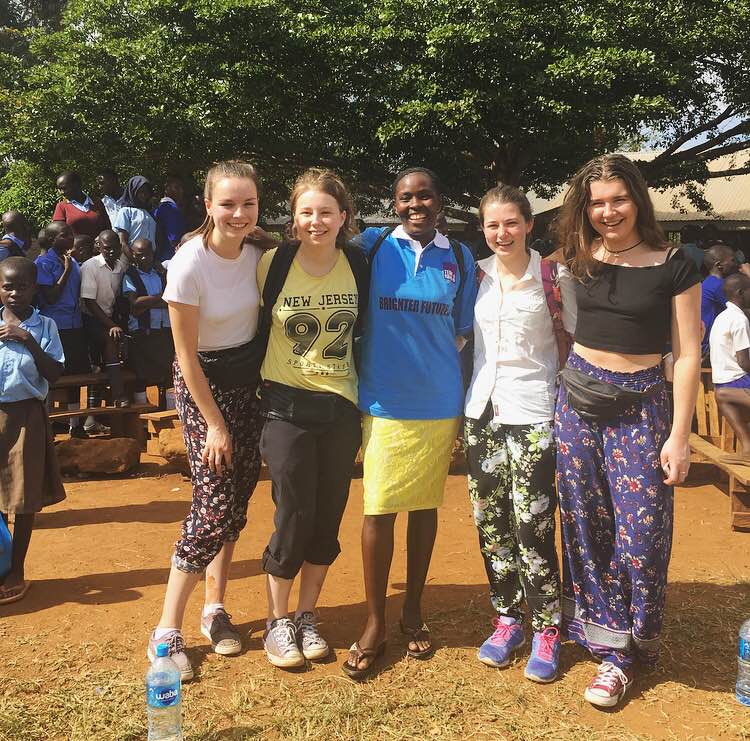Blog
Emma’s blog

I’m Emma Lees and I am a Law student at Newcastle University. I became involved in Team Kenya over a year ago after searching for a society that combined women’s rights with international development, so this charity seemed perfect. I have helped fundraise at the numerous society events as well as organising the pub quiz and Christmas fair. I have always had a passion for this area of work and when the opportunity of visiting Kenya arose I knew I had to come. I had done a similar volunteering trip to Marrakech before – which I loved, although at times I felt like their priorities were not in the right place. I therefore wanted to come back to Africa and do it properly, and this trip provided me with the perfect chance to do that.
The 2 weeks that we spent in Ndhiwa were some of the best of my life. After settling in straight away it almost feels strange coming back to England because I have become so used to the Kenyan way of life! Everyone at Karibuni and in the village generally were so welcoming and I found it inspiring how these people face so many adversities yet still manage to smile and show kindness every single day. I particularly got on well with Erick, who was previously a sponsored student and is now a member of staff, because his cheeky chappy personality made me laugh all the time.
One of the things I found surprising was how hard the women worked yet were still treated as inferior in society. For example, we visited the home of a girl called Lucy, a girl who receives support from Team Kenya who was severely ill with suspected HIV. Upon speaking to her mother, she told us of how she was only a peasant farmer yet was expected to look after the entire family of multiple children whilst the father had gone off to live with his other wife. I was angry at how such an attitude does nothing but to exacerbate the poverty and struggles of the people in the area.
I really enjoyed interviewing the local magistrate in Ndhiwa and learning about the differences in the legal system. I was shocked at the treatment of victims of crime, particularly girls and women who had faced rape and gender-based violence. As the government does not supply much legal aid, most people represent themselves which means the accused ends up cross-examining the victim himself. I found this really shocking because the victim becomes instantly disadvantaged as they will be so intimidated. This was made even worse by the fact that the magistrate interpreted silence as a sign of lying, when it is more likely that the victim is just scared. The magistrate spoke of how corruption in the system was rife and that the majority of cases got ‘settled’ before they even reached court, as money was simply paid to the victim’s family. These multiple problems made me think that it is hardly surprising that rape is so frequent here, because if there are no repercussions then people think that they can get away with it. I was seriously saddened for the girls because the system that is meant to protect them fails them on so many levels and almost sends out the message that what has happened to them is acceptable.
Seeing the squalid living conditions in Kenya was difficult, but it was the more subtle things that made the poverty really hit home for me. For example, we did a home visit to Pius who has a severe skin disease to tell him that he would be able to get his treatment paid for by a sponsor. However his reaction was not as overjoyed as one might imagine and I realised that this was most likely because he had never before even contemplated that his condition could be treated, as people just learn to live with such adversity here. Getting treated is something that we would take for granted in England and this was one of the moments that made me realise how different and unfair life was here, where people did not believe that good fortune could happen to them. Even after meeting Pius for only a few minutes, I could tell that he was so self-conscious of his condition and clearly had faced bullying and teasing at school. The thought of Pius getting better was therefore a truly amazing thought and would finally give him a chance at succeeding in life.
I thoroughly enjoyed the work that we did in Ndhiwa such as running a self-esteem workshop with the sponsored students and the sessions on respect at Ndhiwa Hospital school, Arina school and Pala school. It was good to use different teaching methods and see how well they engaged the children. My favourite moment was watching the girls read all of the empowering things that other people had written about them in the self-esteem session. Every single girl was smiling and giggling, which was heart-warming to watch, especially because they don’t often have affection shown to them.
Hearing Val talk of how bad the village was when she first started working there and seeing how different it is now, such as how confident the people are who have been helped by Team Kenya, proves just how much of an impact the charity has had. Although there is still much work to be done, such as defeating the use of corporal punishment, so much has improved and that in itself is inspiration to carry on. I am looking forward to promoting the charity next year through helping to expand the society and carry on fundraising, but I also hope to continue supporting the work of Team Kenya after my degree because the people of Ndhiwa have had such a huge impact on me. Thank you for an amazing opportunity, one that I will never forget!